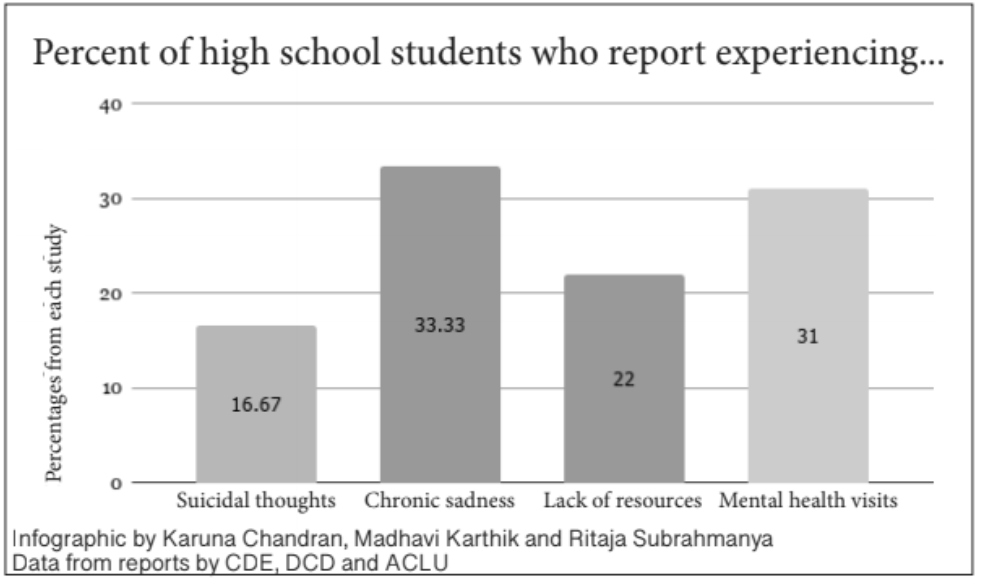By Karuna Chandran, Madhavi Karthik, Shreya Partha and Ritaja Subrahmanya
|
“I think there could be some PTSD,” psychologist Tracy Greene said. “[W]e're going to suffer a lot of depression after [the pandemic], [and] not always [the kind of] depression where you get into bed and can't get out, but just a low level lethargy that's going to be hard to maneuver out of.”
The pandemic has taken a toll on mental and physical health, appearing through anxiety, depression and touch deprivation, child and adolescent psychiatrist Leena Khanzode said. At HHS, Loyd said that there had been 196 referrals for school based mental health services with a total of 222 therapy sessions, at the end of first semester. |
Khanzode said most of her clients are students so she sees a lot of school related issues with the online learning format, which has caused mental health issues to resurface.
“Not being able to get that peer to peer interaction [during remote learning] does affect their motivation and of course, having online school and being on screen for eight hours, has really impacted their motivation and overall well being,” Khanzode said.
Loyd said she predicts a lot of social challenges, in terms of having to rekindle friendships and the general stress of getting back into a routine.
“We didn't have our closings and our endings and our new beginnings,” Loyd said. “We had none of that this past year. So, that in itself is traumatic. We've had people whose relatives have died, whose parents have died, whose grandparents have died. Grief is traumatic.”
According to the University of Michigan, exposure to traumatic events such as death and hospitalizations during the pandemic will lead to the development of PTSD.
Other therapists are predicting it will take seven to nine years to recover from the PTSD of the pandemic, Loyd said. In fact, there has been a 26.3% increase in trauma and stress-related disorders since the beginning of the pandemic, according to a report by the Psychiatric Times.
“We're seeing [PTSD] more so at our hospital. I have more patients who are suffering, who are teenagers, than I do actual COVID patients right now,” health care professional Brandy Van Zandt said.
Specifically for mental health, HHS has created venting sessions to allow students to share their frustrations.
“[Students are] coming to [the sessions to] vent about everything that's going on or [to] share their experiences,” Loyd said. “It allows students to hear their peers who are more than likely experiencing the same thoughts and feelings and having the same experience.”
To further improve mental health resources, Loyd said the curriculum at HHS should expand to incorporate more social and emotional learning in the classroom beyond one advisory lesson.
Loyd said she recommends that students prioritize self care by forming a daily routine with healthy habits, such as getting dressed before class and doing schoolwork away from beds to relieve the monotony.
“It doesn't matter if you say you don't have time because if you don't have your self care then you can't put 100% into your academics,” Loyd said. “You're only as good to others as you are to yourself.”
“Not being able to get that peer to peer interaction [during remote learning] does affect their motivation and of course, having online school and being on screen for eight hours, has really impacted their motivation and overall well being,” Khanzode said.
Loyd said she predicts a lot of social challenges, in terms of having to rekindle friendships and the general stress of getting back into a routine.
“We didn't have our closings and our endings and our new beginnings,” Loyd said. “We had none of that this past year. So, that in itself is traumatic. We've had people whose relatives have died, whose parents have died, whose grandparents have died. Grief is traumatic.”
According to the University of Michigan, exposure to traumatic events such as death and hospitalizations during the pandemic will lead to the development of PTSD.
Other therapists are predicting it will take seven to nine years to recover from the PTSD of the pandemic, Loyd said. In fact, there has been a 26.3% increase in trauma and stress-related disorders since the beginning of the pandemic, according to a report by the Psychiatric Times.
“We're seeing [PTSD] more so at our hospital. I have more patients who are suffering, who are teenagers, than I do actual COVID patients right now,” health care professional Brandy Van Zandt said.
Specifically for mental health, HHS has created venting sessions to allow students to share their frustrations.
“[Students are] coming to [the sessions to] vent about everything that's going on or [to] share their experiences,” Loyd said. “It allows students to hear their peers who are more than likely experiencing the same thoughts and feelings and having the same experience.”
To further improve mental health resources, Loyd said the curriculum at HHS should expand to incorporate more social and emotional learning in the classroom beyond one advisory lesson.
Loyd said she recommends that students prioritize self care by forming a daily routine with healthy habits, such as getting dressed before class and doing schoolwork away from beds to relieve the monotony.
“It doesn't matter if you say you don't have time because if you don't have your self care then you can't put 100% into your academics,” Loyd said. “You're only as good to others as you are to yourself.”

